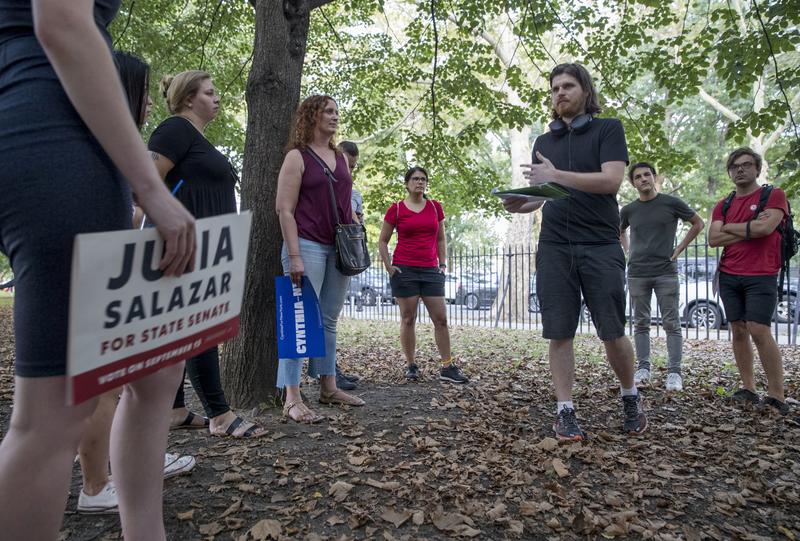
The midterm elections are a month away, which means the next few weeks are an incredibly demanding time for the people who work on campaigns. But there's been a growing movement over the past few months to protect field workers and canvassers from potentially exploitative workplace conditions. A new, independent union called the Campaign Workers Guild formed in February and has bargained contracts for 24 campaigns. It now represents over 500 members nationwide.
That's right. The organizers are getting organized.
Solidarity with the more than 50 workers at @MinnesotaDFL who won recognition for their union. They're the second coordinated campaign to join CWG. #1u pic.twitter.com/ICCpz9uFOu
— Campaign Workers Guild (@CWG_Workers) August 13, 2018
In the past, campaign workers have unionized by joining existing unions for different kinds of workers. But in February of this year, a group of organizers decided there was a need for a separate and specific union for people who work on political campaigns.
Kim McMurray, a former organizer for Vermont Senator Bernie Sanders, was involved in the creation of the guild. She's now on the executive council. She says field organizers often work long, erratic hours and can find themselves suddenly out of a job when their candidate drops out or loses a race.
"The overarching message from leadership on campaigns is that you do this work because you love it. And that’s absolutely true," said McMurray. "That doesn’t mean we should be sacrificing our own well-being to do it."
The union has several top priorities when they come to the bargaining table with a candidate: fair pay, fair scheduling, safe and secure housing, health-care stipends and contract language about sexual harassment and discrimination. But ultimately it's up to the workers to decide what to bargain for.
"We've had people ask for making sure the temperature in their office is a normal amount, to severance at the end of a campaign, to a wide range of things in the middle," said McMurray. "We made it pretty typical that you'll get paid for at least two weeks after the campaign, which was really not something that's been standard before."
McMurray says the Campaign Workers Guild is open to representing Democratic and Republican campaign workers, though so far all of their members work for Democratic candidates.
"For decades, the majority of workers on campaigns, especially Democratic ones, have been denied the very same protections that their candidates publicly champion," said McMurray. "There became a real disconnect."
When you’re uninsured working for less than minimum wage, and your candidate’s stump says they believe in $15/hour and healthcare for all. pic.twitter.com/ta5gMAFKbC
— Campaign Workers Guild (@CWG_Workers) July 12, 2018
All this means, between severance packages, higher hourly wages, and healthcare stipends, candidates who agree to the demands of their unionized staff end up spending more to run their campaigns. Julia Salazar, a Democratic candidate for New York State Senate, is one of two active candidates in New York whose workers have unionized under the Campaign Workers Guild. She says severance packages and higher hourly wages were the biggest points of negotiation.
"That was probably the most important thing and that also naturally took more out of our budget," Salazar told WNYC. "Our negotiations were brief. I really wanted to provide the strongest contract and the most generous contract that I was able to."
Salazar, herself a member of the National Writers Union, says agreeing to better working conditions is part of "walking the walk" as a progressive candidate.
Campaign workers for Max Rose, a Democrat running for New York's 11th congressional district, have also unionized under the Campaign Workers Guild. Now non-active New York campaigns whose workers unionized through CWG include Cynthia Nixon for governor, Ross Barkan for state senate and Brian Flynn for congress.
